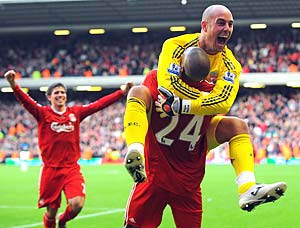English Premier League take stern action with Financial Foul Play regulations
 After calls of financial foul play and cries of unfair advantages in the English Premier League, action was finally taken this week to prevent overspending and spiralling wage bills. Each of the 20 clubs were asked to vote on the new financial regulations, and when 13 of them agreed, the two-thirds majority was reached to allow the changes to take place.
After calls of financial foul play and cries of unfair advantages in the English Premier League, action was finally taken this week to prevent overspending and spiralling wage bills. Each of the 20 clubs were asked to vote on the new financial regulations, and when 13 of them agreed, the two-thirds majority was reached to allow the changes to take place.
The details of the new regulations state that each club is only permitted to make a combined loss of £105m within a three year period, starting from next season. Investment in academies and improvement to stadia are exempt from this figure, so as not to discourage clubs from developing facilities and young talent. Wage expenditure is also being monitored, with clubs spending over £52m annually only allowed to increase their wage bill by an accumulative extra £4m per season. Premier League boss Richard Scudamore is adamant that these regulations will be strictly adhered to, under the risk of punishment. He said ‘If people break the £105m we will look for the top end ultimate sanction range – a points deduction’. Any club that fails to meet the financial criteria could see points deducted for the 2016/17 season.
Of the 20 Premier League clubs, only three have actually posted losses over the £105m threshold in the past three years. Liverpool, Chelsea and Manchester City would have been affected by these new rules, should they have been introduced three years ago, with the main cause for the losses of these three clubs mainly being increased transfer activity. Manchester City are understood to have voted against the introduction of the new rules, although Chelsea were reportedly in favour of them.
With the current Owners’ and Directors’ Test causing some controversy, the Premier League has stepped in to clarify the situation. Clubs who make a £5m annual loss must have to guarantee those losses against the owner’s assets. This will assist to curb overspending, and it is hoped that another situation like the current Portsmouth debacle will not occur. There is no doubt that the rules currently being put in place are designed to prevent financial ruin, administration and possibly liquidation.
The new regulations will be in place to coincide with the explosion in television revenue in the Premier League, with a 70% increase from broadcasting rights set to arrive. Clubs, especially the so-called smaller clubs, were previously wary that knowledge of this cash boost might increase the wage demands of players as well as agent fees.
Although the long term aim for these regulations is to encourage clubs to become financially stable and eventually break even or make a profit on a yearly basis, the figure of £105m worth of losses is much larger than the figure introduced by UEFA this season. UEFA have demanded that any team competing in European competition must record no more than a £39.4m loss in the three years that culminate at the end of the 2014/15 season.
There is no doubt that these new rules will benefit English football, and will prevent overspending to the point that clubs are forced into administration. With the increased television revenue being protected from use on transfer fees and wages, youth development and ticket price reductions may be areas that benefit the most. In one of the most competitive leagues in Europe, no club will want to risk facing the wrath of the Football Association and begin the 2016/17 season with a points deduction to make up on their rivals.


